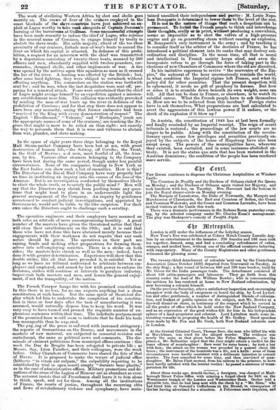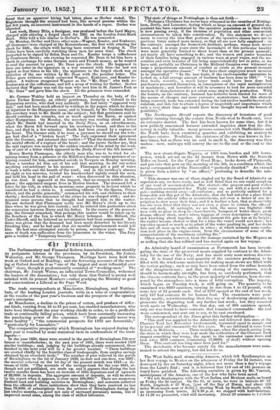64t 3Ertropallo.
London is still under the influences of the holyday season.
New Year's Eve was celebrated at Colney Hatch County Lunatic Asy- lum by an entertainment to the inmates : 230 females and 166 men took tea together, danced, sang, and had a concluding refreshment of cakes, oranges, and mulled beer, without one of the afflicted creatures behaving with impropriety. Many of the County Magistrates and other gentlemen witnessed the pleasing scene.
The twenty-third detachment of colonists 'sent out by the Canterbury Association (since October 1850) departed from Gravesend on Sunday, in the ship Stag ; a fine vessel of between 600 and 700 tons burden, built by Mr. Green for the India passenger trade. The detachment consisted of about 120 cabin-passengers and labourers. They go forth from this country under the lead of Mr. William Bowler; who is consummating the services he has rendered at home to New Zealand colonization, by now becoming a colonist himself. On the previous Saturday, after a satisfactory inspection and encouraging inter view with the body a emigrants on board the ship, by Lord Lyttel- ton and other gentlemen, a number of distinguished friends of coloniza- tion, and leaders of public opinion on the subject, met Mr. Bowler at a farewell dinner on shore, in testimony of the respect which he earned in all the grades of office which he held under the New Zealand Company, and as an expression of the good wishes felt for him in his independent sphere of a land-proprietor and colonist. Lord Lyttelton made some in- teresting remarks in proposing the health of Mr. Godley. Good speeches were made by Mr. Fox and Mr. Cook, both New Zealand colonists now in London.
At the Central Criminal Court, Thomas Bare, the man who killed his wife at Marylebone, was tried for the alleged murder. The evidence was nearly the same as that given before the Police Magistrate. i'or the prisoner, Mr. Ballantine urged that the Jury might return a verdict for the lesser offence of manslaughter : Bare went for some boxes ; he took a boy with him ; the attack on the woman was preceded by a quarrel about the boxes ; the instrument of the homicide was a file, not a knife : some of these circumstances were hardly consistent with a deliberate intention to commit murder. The Jury consulted for some time, and then convicted of man- slaughter. Mr. Baron Platt seemed, from his address to the prisoner, to have been hardly satisfied with the lenient verdict : he passed a sentence of trans- portation for life.
About three weeks ago, Arnold Gerber, a foreigner, was charged at Marl- borough Street Police Office with uttering a forged check for 3401. on the Westminster branch of the London and Westminster Bank. Gerber told a plausible tale, that he had been sent with the check by a "Mr. Sims," who had hired him at Osmond's Coffeehouse in the Strand, in consequence of Gerber having advertised for a situation. A Policeman made inquiries, and found that an apparent hiring had taken place as Gerber stated. The Magistrate thought the accused had been, like several persons within the last few years, an innocent instrument in the hands of a rogue. Gerber was liberated.
Last week, Henry Blitz, a foreigner, was produced before the Lord Mayor, charged with uttering a forged check for 3361. on the London Joint Stock Bank. Blitz told a tale similar to Gerber's. He was remanded. On Monday, Gerber and three other men—Wagner, Kessler, and Krakauer, all Germans—were charged at the Mansionhouse, the first with uttering the check for 3401., the others with having been concerned in forging it. The Police have been carefully watching these men for some time. The check purported to be signed by Selim Dean and Co. Kessler keeps a coffeehouse
Cranbourn Street ; one evening he requested Mr. Dean to let him have a check in exchange for some German notes and French money, as he wanted to send the amount by post; Mr. Dean gave the check. fle happened to form one letter in the signature in a way unusual with him—he had not signed so four times in his life; the signature to the forged check was an imitation of the one written by Mr. Dean with the peculiar letter. The Police gave evidence which connected Wagner, Krakauer, and Kessler to- gether. A waitress recognized Wagner as the " Mr. Sims" who took re- freshments at the coffeehouse, and left a scrap of writing for Gerber. Gerber declared that Wagner was not the man who met him in St. James's Park as "Mr. Sims" and gave him the check. All the prisoners were remanded.
Mr. Coroner Wakley held an inquest on Thursday on the body of the Baron Farkas Kemeny, an elderly gentleman, formerly a Colonel in the Hungarian service, who died very suddenly. He had lately "appeared very dull," and had been much affected by writings in the papers which he deem- ed injurious to the Hungarian cause, and to himself, by-Mr. Toulmin Smith. His secretary went to Mr. Smith on the subject; but that gentleman said he should continue his remarks, not so much against the Baron, as against other Hungarians. On Monday, the secretary was reading aloud a letter which Mr. Smith had inserted in the Daily News, as an advertisement, when the Baron fell forward upon his secretary's breast, and then to the floor, and died in a few minutes. Death had been caused by a rupture of the heart. The Coroner said, if he were a juryman he should say the refu- gee had died of a " broken heart." The Jury expreased their agreement with the Coroner, and returned this verdict—" That the deceased died from the mortal effects of a rupture of the heart; and the jurors further say, that the said rupture was caused by the sudden emotion of his mind by the read- ing of 'part of a letter which appeared in the Daily News of the 5th instant."
Henry Martin Flannagan, the elderly man who was to be tried for ob- taining money from a prisoner at the Middlesex Sessions under pretence of re- taining counsel for him, committed suicide in Newgate on Monday morning. When a turnkey let him out of his cell that morning, he did not notice anything extraordinary in his manner. Flannagan got a pail of water to wash a table and the hearth of the ward; and in the turnkey's absence for eight or ten minutes, twisted his handkerchief tightly round his neck, and held his head in the pail of water: when discovered in this situation, he was dead. It appeared at the inquest, that no surgeon reside& in the prison ; the appointed surgeon lives in Hatton Garden. The deceased left a letter for his wife, in which he mentions some property in Ireland which he considered he had a claim to. A rambling address "to the Queen, Prince Albert, and the public generally," commended his wife and children to their charity ; declared his innocence of the crime he was charged with ; and de- nounced some persons that be thought had injured him in the matter. His son declared that Flannagan really was Mr. Horry's clerk up to the time when he was given into custody; and he entered into particulars about the connexion between Horry and his father. In the course of the proceed- ings, the Coroner remarked, that perhaps this matter would be taken up by the Benchers of the Inn to which Mr. Horry belonged. Mr. Millard, the Under-Sheriff, said he believed an investigation had been commenced. Evi- dence was given that the deceased had been much disturbed by his friends forsaking him; and he had said that six months' imprisonment would kill him. He had once attempted suicide by poison, seventeen years ago. The cause of death was suffocation from the immersion in the water. The Jury gave a verdict of "Temporary insanity."



























 Previous page
Previous page